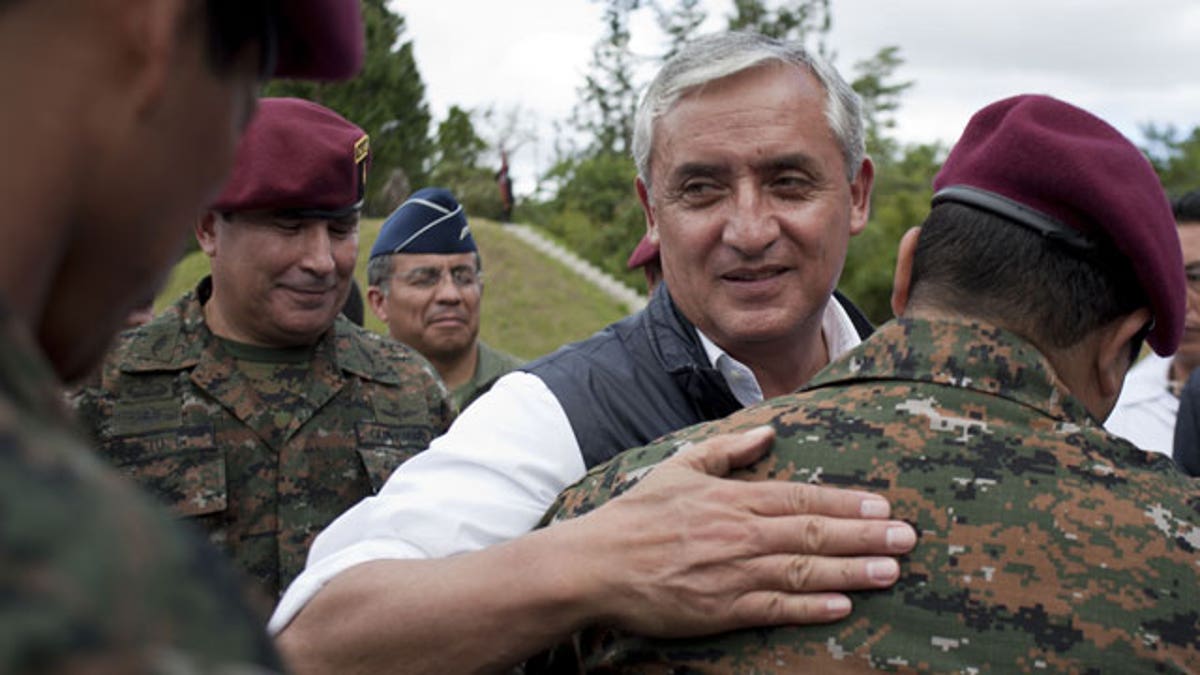
In this Dec. 5, 2011 file photo, Guatemala's President-elect Otto Perez Molina, center right, greets new members of Guatemala's Army elite special forces, "Kaibiles," at a graduation ceremony in Poptun, Guatemala. (AP)
GUATEMALA CITY – Former general Otto Perez Molina takes office as Guatemala's new president Saturday with a top priority of ending a long-standing U.S. ban on military aid imposed over concerns about abuses during the Central American country's 36-year civil war.
Perez, who was a top military official during the war, has long insisted there were no massacres, human rights violations or genocide in a conflict that killed 200,000 civilians, mostly Mayan Indians.
But he won the presidency campaigning on a pledge to crack down on soaring crime, including one of the highest murder rates in the Western Hemisphere, and he will need U.S. help to battle the Mexican drug gangs that have overrun Guatemala.
Close advisers say he supports meeting the conditions set by various U.S. congressional appropriations acts for restoring aid that was first eliminated in 1978 halfway through the civil war.
Among the required steps is reforming a weak justice system that has failed to bring those responsible for abuses to justice. A U.N.-sponsored postwar truth commission said state forces and related paramilitary groups committed most of the killings.
The U.S. also insists that the government support a United Nations-supported international anti-corruption team whose prosecution effort has been criticized by Guatemala's political elite.
"I do believe Otto Perez Molina will pursue the lifting of the military ban," said Harold Caballeros, the incoming foreign minister. "There is nothing that I hold to be more certain than Otto Perez Molina's commitment to improving the justice system as a whole in Guatemala."
Transition team leader Eduardo Stein, a former Guatemalan vice president, said Perez shares the same goals as Washington and will keep the current attorney general, Claudia Paz y Paz, who is supported by the U.S. and human rights groups for her aggressive prosecution and reputation for staying above the country's rampant public corruption.
But he added that Perez is doing what is right for Guatemala, not for the United States.
"The president-elect has decided to continue with the current attorney general and to confirm some of these civil rights issues out of conviction, not because of a request from a foreign government," Stein said.
The 61-year-old Perez, a member of the right-wing Patriotic Party, lost his first presidential bid in 2007 to Alvaro Colom, who he is succeeding Saturday.
He won handily this time with campaign promises to deal with criminals with an "iron fist," a stand that resonated in a country of more than 13 million people where murders are committed at a rate of 45 for every 100,000 residents. That is almost three times higher than in neighboring Mexico.
But Perez also moderated his message by pledging to show compassion and respect for the rule of law.
He made his military career as an intelligence specialist, one of the most influential sections of the army. He has never been implicated in massacres or other crimes attributed to the military during the 1960-1996 war with Marxist rebels, and he was a military representative on the team that negotiated peace.
Since cutting off U.S. military aid, the U.S. Congress has over the years approved limited funding for training Guatemala's military response team for natural disasters.
But Perez wants military equipment to battle Mexican drug traffickers, who have taken over parts of Guatemala bordering Mexico. Colom last year sent troops to northern provinces seeking to weaken the hold of the fierce Zetas cartel, which controls drug and smuggling routes through Guatemala.
Many in the U.S. are taking a wait-and-see approach to Perez given his military background. President Barack Obama took two weeks to congratulate Perez on his November election victory, something some read as a chilly sign.
"They want to sort of say, look, we're prepared to cooperate, but it depends on who is in the government, what priorities they have," said Cynthia Arnson, director of the Latin America program at the Wilson Center in Washington. "It doesn't come with a free ride."
Sen. Patrick Leahy, a Vermont Democrat who wrote legislation prohibiting aid, was more direct about what Guatemala needs to change.
"The army has a role in border security and in protecting against external threats, but it needs to demonstrate that it is accountable to civilian authority for atrocities during the internal armed conflict," said a statement from Leahy, who is chairman of the appropriations subcommittee that funds the State Department and international aid programs.
The appropriations act says Guatemala can regain aid once the U.S. secretary of state certifies that the military is "respecting internationally recognized human rights" and cooperating with judicial investigations of former military personnel and with the International Commission Against Impunity in Guatemala.
The act says Guatemala's military must cooperate with the U.N.-backed commission, including facilitating testimony before the team of police and prosecutors from 25 nations that has rankled the political elite by going after senior officials.
Caballeros, the incoming foreign minister, and Stein, the Perez adviser, said the new president will support the commission, which is up for reauthorization in September. Stein said Perez will work to help transfer its prosecutorial capacity to Guatemala authorities.
But Stein also said Perez can't afford to wait on the U.S.
"If the ban is lifted it will take many months for this to materialize, and the president-elect wants to show results in security issues as quickly as we take office," Stein said. "He will have to resort to other resources" if U.S. aid isn't authorized.
